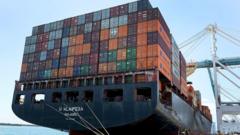The Cook Islands' recent agreements with China have ignited tension with allies like New Zealand and Australia, highlighting shifting geopolitical dynamics in the Pacific region.
Cook Islands’ China Agreements Spark Concerns Among Allies

Cook Islands’ China Agreements Spark Concerns Among Allies
Cook Islands’ Prime Minister signs deals with China, raising alarms among traditional allies.
The Cook Islands, a Pacific nation known for its scenic beauty, has recently drawn the ire of its traditional allies following Prime Minister Mark Brown's signing of significant agreements with China. The new deals encompass essential sectors such as infrastructure, tourism, agriculture, technology, and crucially, deep-sea mineral exploration — marking the first of such collaborations with a non-traditional partner.
Brown’s actions have sparked considerable backlash domestically and internationally, particularly as he pursued these pacts without public consultation or informing New Zealand, a country with which Cook Islands has had a "free association" since the 1960s. The implications of this decision have led to protests on Rarotonga, the largest of the Cook Islands, as well as a failed vote of no confidence against Brown in parliament.
Supporters of the agreements argue that the Cook Islands should prioritize its "long-term interests," particularly in light of its vulnerability to climate change. However, many citizens, including prominent community members, express concern that their resources are at risk of being sold off to the highest bidder in a practice they deem detrimental to future generations.
China’s increasing influence in the Pacific region complicates the geopolitical landscape. While the West has sought to counteract Beijing's presence through regional alliances, Brown’s pivot towards China signals a shift that could diminish Western influence.
Australia and New Zealand have reacted with alarm, indicating feelings of betrayal. Australia's leadership has pledged to enhance its diplomatic efforts in the region, as it feels the pressure of maintaining influence amid rising Chinese assertiveness. Recently, exercises involving Chinese military ships near Australia triggered diplomatic red flags and exposed vulnerabilities in regional security alliances.
The Cook Islands' relationship with New Zealand was historically solid, yet this recent turn raises questions about how effectively these alliances can be maintained in an evolving geopolitical context, especially as both China and the U.S. recalibrate their strategies in the Pacific.





















